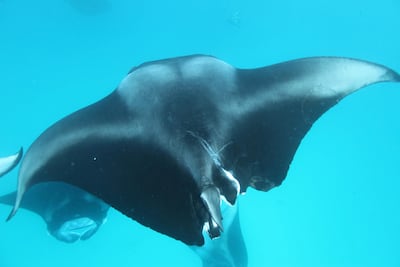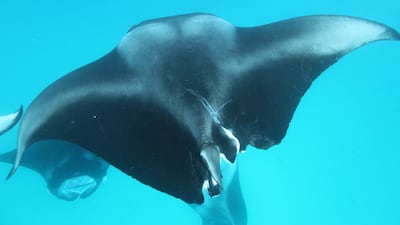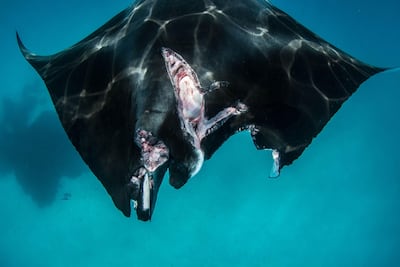Researchers in the Maldives were stunned this month to see the return of a manta ray just six months after it sustained devastating injuries.
Babaganoush, nicknamed Baba, is one of more than 5,000 reef manta rays identified and tracked by research outfit Manta Trust in the Maldives. He is well known in Hanifaru Bay and has been sighted over 200 times since 2005.
In November 2018, Baba had been seen carrying horrific injuries after being hit by a speedboat.
The Manta Trust said the boat’s propeller had cut so deep into his body that his internal organs were exposed, causing the worst injuries they had seen on a living ray.
Manta rays are vulnerable to boat strikes in the Maldives while feeding or travelling on the ocean surface, especially outside the few small protected areas where boat speed restrictions are in place.
The team thought Baba’s days were numbered but just six months after being injured, on May 4 he reappeared in the bay. His injuries had healed better than anyone could have hoped and he was swimming well.
“We are thrilled that Babaganoush is alive and well, but unfortunately many other manta rays, sea turtles and whale sharks are not so lucky,” said Dr Guy Stevens, founder and chief executive of Manta Trust.
“Each year as speedboat traffic significantly increases in the Maldives, where little or no speed limits are in place throughout much of the country, the nation’s marine life faces a serious threat from the unregulated impacts of rapid human development.”

Manta Trust is asking the Maldives government to save rays and other creatures by extending the protective regulations it has enacted around Hanifaru Bay, which is known to attract huge numbers of manta rays and was recently featured on the BBC's Blue Planet II series.
In June 2018 the UAE Ministry of Climate Change and Environment announced the National Plan of Action for the Conservation and Management of Sharks 2018-2021 to protect wildlife off the coast of the Emirates, particularly some threatened species.
It gives concrete steps to develop public awareness and strictly enforce legislation to protect sharks, skates, rays and chimaeras.



